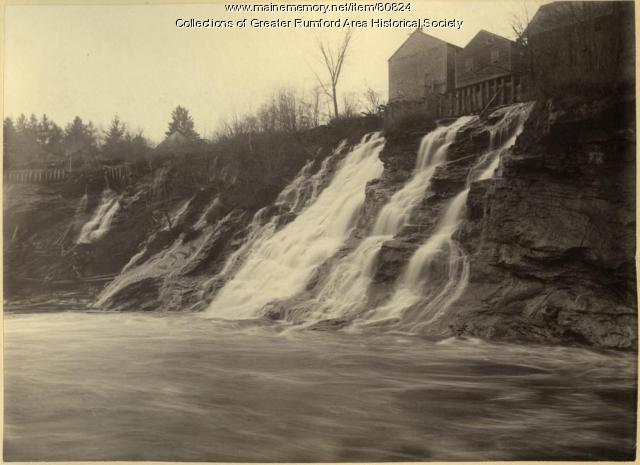Keywords: High School Play
Item 37061
John Bapst High School Orchestra, Bangor, ca. 1931
Contributed by: John Bapst Memorial High School Date: circa 1931 Location: Bangor Media: Photographic print
Item 23359
Cast of the Biddeford High School senior play, 1924
Contributed by: McArthur Public Library Date: 1924 Location: Biddeford Media: Photographic print
Exhibit
Public education has been a part of Maine since Euro-American settlement began to stabilize in the early eighteenth century. But not until the end of the nineteenth century was public education really compulsory in Maine.
Exhibit
Good Will-Hinckley: Building a Landscape
The landscape at the Good Will-Hinckley campus in Fairfield was designed to help educate and influence the orphans and other needy children at the school and home.
Site Page
Surry by the Bay - Surry Village School
"… this, Surry students chose to go to Ellsworth High School, where they performed very well. This was especially true in the early 1940s as evidenced…"
Site Page
Western Maine Foothills Region - Rumford High School Basketball - 1970s - Page 1 of 2
"Whether it was Stephens High or Rumford High, there has always been a strong sports tradition at the schools."
Story
Bob Hodge:A rocky road to become Biddeford school superintendent
by Biddeford Cultural & Heritage Center
The son of immigrants, Bob's hard work and determination leads to a life of community service.
Story
Sister Therese Bouthot:Life of service as a Good Shepherd sister
by Biddeford Cultural & Heritage Center
From humble beginnings to playing a leadership role in the service of others
Lesson Plan
Grade Level: 9-12
Content Area: Social Studies, Visual & Performing Arts
When European settlers began coming to the wilderness of North America, they did not have a vision that included changing their lifestyle. The plan was to set up self-contained communities where their version of European life could be lived. In the introduction to The Crucible, Arthur Miller even goes as far as saying that the Puritans believed the American forest to be the last stronghold of Satan on this Earth. When Roger Chillingworth shows up in The Scarlet Letter's second chapter, he is welcomed away from life with "the heathen folk" and into "a land where iniquity is searched out, and punished in the sight of rulers and people." In fact, as history's proven, they believed that the continent could be changed to accommodate their interests. Whether their plans were enacted in the name of God, the King, or commerce and economics, the changes always included and still do to this day - the taming of the geographic, human, and animal environments that were here beforehand.
It seems that this has always been an issue that polarizes people. Some believe that the landscape should be left intact as much as possible while others believe that the world will inevitably move on in the name of progress for the benefit of mankind. In F. Scott Fitzgerald's The Great Gatsby a book which many feel is one of the best portrayals of our American reality - the narrator, Nick Carraway, looks upon this progress with cynicism when he ends his narrative by pondering the transformation of "the fresh green breast of a new world" that the initial settlers found on the shores of the continent into a modern society that unsettlingly reminds him of something out of a "night scene by El Greco."
Philosophically, the notions of progress, civilization, and scientific advancement are not only entirely subjective, but also rest upon the belief that things are not acceptable as they are. Europeans came here hoping for a better life, and it doesn't seem like we've stopped looking. Again, to quote Fitzgerald, it's the elusive green light and the "orgiastic future" that we've always hoped to find. Our problem has always been our stoic belief system. We cannot seem to find peace in the world either as we've found it or as someone else may have envisioned it. As an example, in Miller's The Crucible, his Judge Danforth says that: "You're either for this court or against this court." He will not allow for alternative perspectives. George W. Bush, in 2002, said that: "You're either for us or against us. There is no middle ground in the war on terror." The frontier -- be it a wilderness of physical, religious, or political nature -- has always frightened Americans.
As it's portrayed in the following bits of literature and artwork, the frontier is a doomed place waiting for white, cultured, Europeans to "fix" it. Anything outside of their society is not just different, but unacceptable. The lesson plan included will introduce a few examples of 19th century portrayal of the American forest as a wilderness that people feel needs to be hesitantly looked upon. Fortunately, though, the forest seems to turn no one away. Nature likes all of its creatures, whether or not the favor is returned.
While I am not providing actual activities and daily plans, the following information can serve as a rather detailed explanation of things which can combine in any fashion you'd like as a group of lessons.
Lesson Plan
Maine in the News: World War I Newspaper Project
Grade Level: 9-12
Content Area: Social Studies
This lesson plan is designed to introduce students to the important role that Maine played in World War I. Students will act as investigators in order to learn about the time period as well as the active role that Maine took on.















